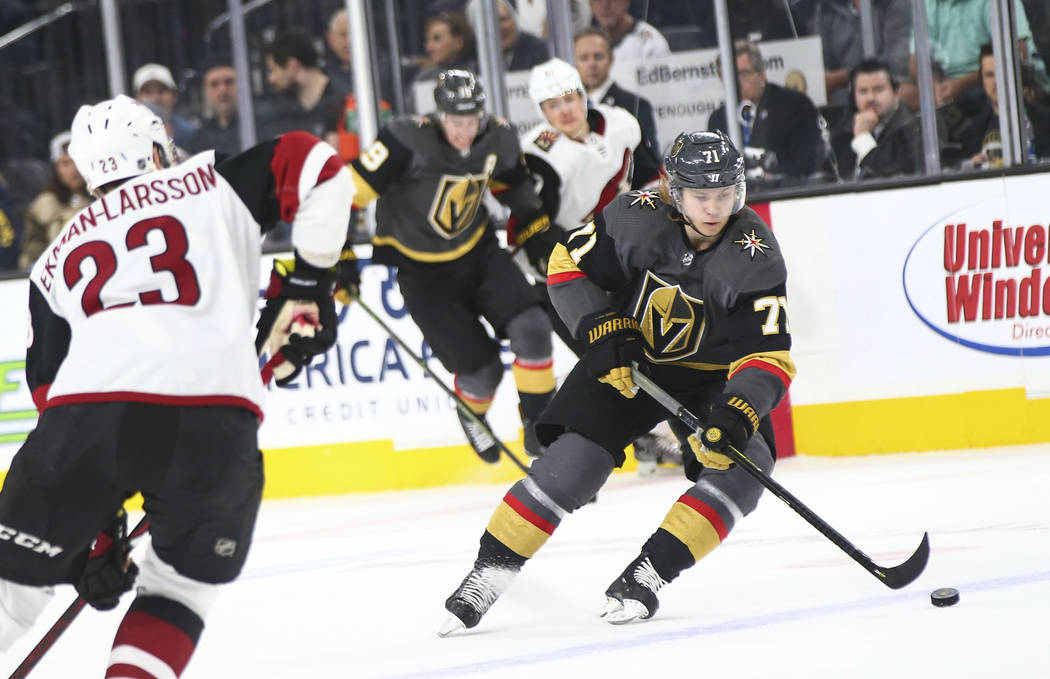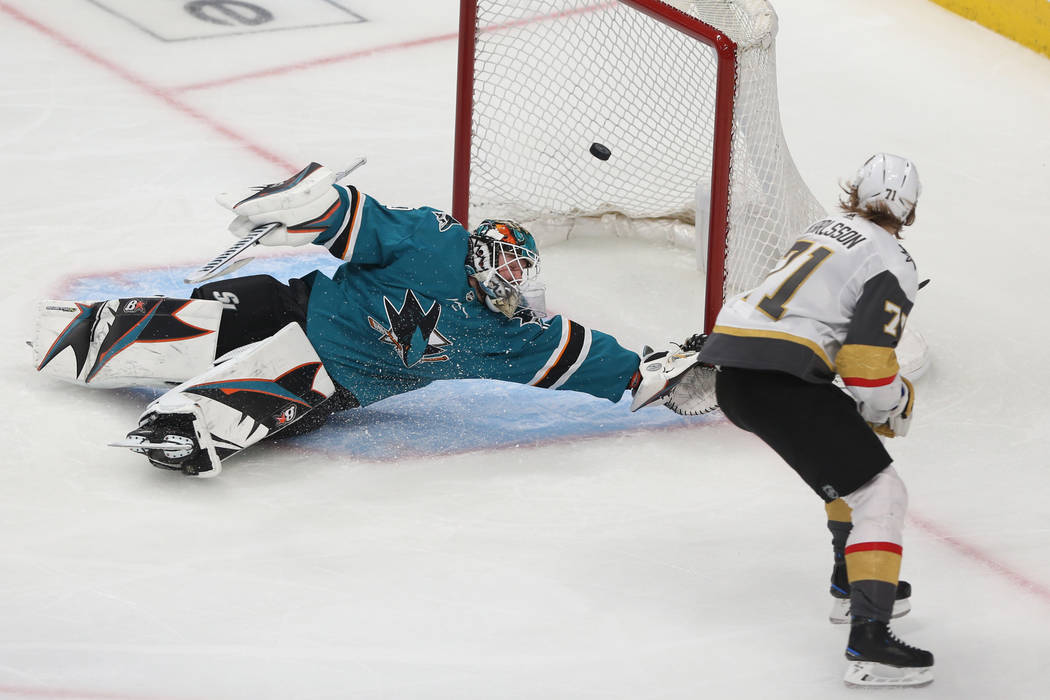Golden Knights Karlsson is prime candidate to get offer sheet
When William Karlsson stood in front of his locker at City National Arena in late April, he twice made reference to the possibility of not returning to the Golden Knights.
This isn’t to say the restricted free-agent center is leaving town, so don’t freak out just yet.
But it does illustrate that even the perpetually glass-half-full Karlsson recognizes the Knights’ salary cap constraints.
“Hopefully we can get a long-term deal going, and hopefully I’ll stand here in the fall,” he said following the postseason. “This is where I want to play. Hopefully I’ll be here for next year, too.”
Karlsson’s future could go a number of directions, from that new contract he mentioned to an unpleasant arbitration hearing or — gasp! — even a trade.
He’s also a prime candidate to receive the seldom-used offer sheet, which could put a serious crimp in general manager pro tem George McPhee’s best-laid plans for the summer.
Briefly, an offer sheet is a contract from another club that most restricted free agents are eligible to receive after they’ve turned down the qualifying offer from their controlling club. Once a player signs an offer sheet, his former team has seven days to match or it loses the player.
General managers have been loathe to use the tactic since it often requires them to overpay for players and consequently inflates salaries. Relinquishing draft picks as compensation also is often a deterrent.
And, quite frankly, stealing away a player doesn’t exactly go over well with fellow GMs, either.
Dustin Penner went from Anaheim to Edmonton in 2007, and the five-year, $21.25 million deal famously led then-Ducks GM Brian Burke to call counterpart Kevin Lowe “gutless” and offer to rent a barn so the two could fight.
Since the 2004-05 lockout, eight players have signed an offer sheet and Penner is the only one to change teams.
The last offer sheet was handed out in 2013 when Calgary signed center Ryan O’Reilly to a two-year, $10 million contract that Colorado quickly matched.
But this current RFA class is historically loaded — Toronto’s Mitch Marner, Tampa Bay’s Brayden Point, Colorado’s Mikko Rantanen and Matthew Tkachuk of Calgary, to name a few — leading to speculation the offer sheet could make a comeback this summer.
McPhee and incoming Knights GM Kelly McCrimmon declined to be interviewed through a team spokesperson for this story. Karlsson’s agent, Michael Deutsch, did not return messages seeking comment.
“To me, the area where there is a great potential for offer sheets, albeit less sexy, is in the $3 million to $3.5 million range,” said prominent player agent Allan Walsh, whose clients include Knights goaltender Marc-Andre Fleury. “That’s the sweet spot. I’ve been surprised in prior years that there haven’t been more offer sheets in that range … because that’s where offer sheets can be an effective tool.”
Karlsson does not quite fit that description, as he earned $5.25 million this past season when he was second on the Knights with 24 goals and 56 points in 82 games and led the team’s forwards in average ice time.
Over the past two seasons, Karlsson’s 67 goals are ninth in the league among centers and his 134 total points rank in the top 50, regardless of position.
That makes the 26-year-old an intriguing option for a team looking to add a top-six center (and stick it to the Knights in the process).
“We just have more data to work with,” McPhee said in April when asked about Karlsson’s contract. “We’re pretty clear on what kind of player he is, and I believe he is as well.”
Carolina in play?
Karlsson asked for $6.5 million in arbitration last season before agreeing to a one-year deal and likely will request more in arbitration from the Knights this time. EvolvingWild’s NHL contract model projects Karlsson to receive a $6.45 million average annual salary over five years.
If a club such as Carolina or Ottawa swooped in and tabled a five-year offer sheet with an average annual salary in the neighborhood of $7.5 million to $8 million, the Knights could have a difficult time matching.
That seems like a steep price at first glance, especially when the compensation paid to the Knights is factored into the equation (first-, second- and third-round picks in 2020).
But Karlsson could command a larger salary as an unrestricted free agent in 2020 should he increase his offensive production next season. And the cost to acquire him in a trade at this juncture almost certainly is more than three picks.
Carolina is well positioned to hand out an offer sheet with more than $28 million in cap space, according to CapFriendly.com, and five selections in the opening three rounds of the 2020 draft. The Hurricanes could use another pivot behind leading scorer Sebastian Aho.
Ottawa has a dearth of centers and more than $35 million in cap space, though the Senators have shown an allergy to spending money.
Detroit and Minnesota also check the boxes to sign Karlsson, though it’s unlikely. Philadelphia has an abundance of cap space ($33.4 million), but traded for pending unrestricted free-agent center Kevin Hayes on Monday to shore up its second line.
The deadline for clubs to make qualifying offers to restricted free agents in order to retain their rights is 5 p.m. Eastern time on June 25. Clubs can discuss an offer sheet with players beginning at 12:01 a.m. Eastern time on June 26, and the first day they can accept is July 1.
Players cannot sign an offer sheet if they file for arbitration before the July 5 deadline.
“Ever since I got here, I’ve been very happy, both on and off the ice,” Karlsson said. “I see this team has a great chance of winning in the future. This is definitely where I want to be and be a part of.”
More Golden Knights: Follow at reviewjournal.com/GoldenKnights and @HockeyinVegas on Twitter.
Contact David Schoen at dschoen@reviewjournal.com or 702-387-5203. Follow @DavidSchoenLVRJ on Twitter.
Offer sheet compensation for 2019/20
(Based on the number of years offered or five years, whichever is shorter)
Offer sheet annual average salary; Compensation
*$1,395,053 or below; None
*$1,395,054-$2,113,716; 3rd-round pick
*$2,113,717-$4,227,437; 2nd-round pick
*$4,227,438-$6,341,152; 1st-, 3rd-round picks
*$6,341,153-$8,454,871; 1st-, 2nd-, 3rd-round picks
*$8,454,872-$10,568,589; Two 1st-, one 2nd-, one 3rd-round picks
*$10,568,590+; Four 1st-round picks
Source: CapFriendly.com
























